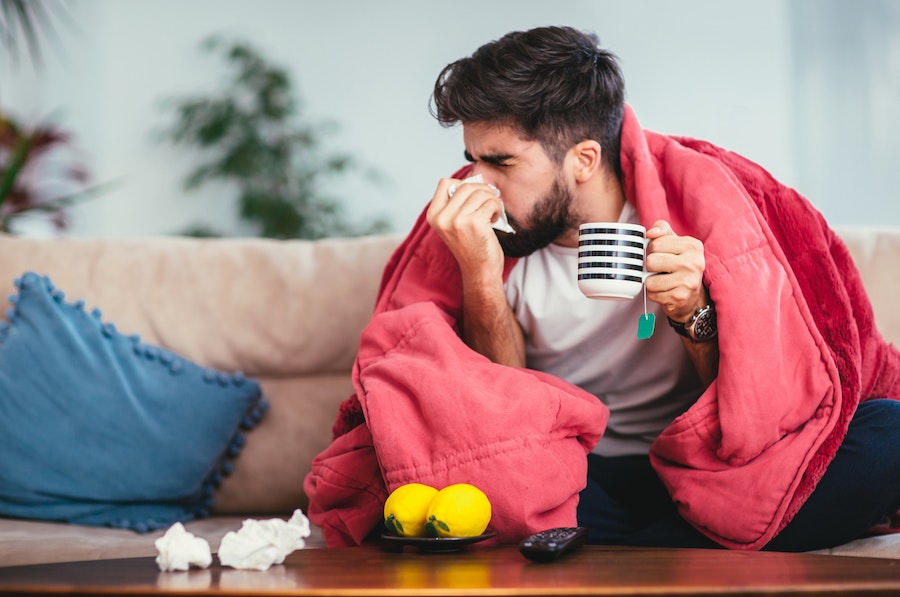Sniffle season is upon us – how to stop other people from getting your cold
It’s that time of year again – GP surgeries are overrun with coughing and spluttering, while children are wiping their noses on their sleeves and just getting onto a commuter train means dicing with disease.
Perhaps the most universally annoying minor malady known to man, most of us will endure a cold at least once over the coming months. But the common cold doesn’t have to be an inevitability, and it’s sensible behaviour by the already-infected that’s most effective at keeping the rest of us safe.
Here are a few tips on how not to spread your cold to your family, friends, and everyone you bump into on the street.
1. Wash your hands

Frankly, you should be doing this anyway, but washing your hands regularly is the number one way to safeguard your surroundings. On average we touch our faces at least once every couple of minutes, so unwashed hands quickly turn into hyper-efficient germ distributors.
Hand sanitisers are also effective counter-measures, but in addition to a good wash, not instead of it.
2. Cough smart

Perhaps the primary cold-related confusion: Coughing into your hands is not a good idea, and if you’ve read the first item on this list it should be pretty clear why. Tissues are best – assuming you bin them immediately. But if none are unavailable the best option is the crook of your elbow. You might look like a celebrity trying to avoid the paparazzi (or performing an ill-advised dab), but for the tissue-less cougher it should be the go-to method for avoiding transmission.
3. Avoid communal items

When it comes to colds, sharing is uncaring. Strictly regiment things like plates, mugs and blankets, and avoid appliances like microwaves or kitchen taps that other people have to use. If at work, excuse yourself from the office tea round, and don’t start meetings with a handshake.
Towels are a classic domestic infector – clearly demarcate your towel and make sure not to use anyone else’s. When it comes to washing it, throw the towel straight in the machine and load the rest of the wash yourself.
4. Avoid public transport
It’s an extremely well-trodden path: Get on train, sneeze into hand, hold onto handrail, infect entire carriage. Some viruses can live on foreign surfaces – doorknobs, arm rests, ticket machines – for up to eight hours, and loudly expelling your germs over sardine-like commuters is a quick way to contaminate the lot.
If you can walk instead, do – as long as you wrap up warm a little fresh air helps clear your system. This should also save you an eyeballing, as crowded train sneezers get some of the dirtiest looks known to man. Otherwise, carry tissues and hand sanitiser.
5. Stay in your ‘sick room’

We get that not everyone can segregate themselves every time they get a bit sniffly – you might have a company to run, or a Brexit deal to vote on – but for those who can, confining yourself to a ‘sick room’ is a sure fire way to keep the spread of germs in check.
Stock up on supplies, medicine and video games, and appoint a maximum of one other person to tend you on your sick bed. This may sound a bit 28 Days Later, but when really under the weather some good old solitary confinement is exactly what the doctor ordered.
6. Get better
This may sound obvious, but the best way to stop those around you from getting sick is to not be sick yourself. Keep warm, stay hydrated and get plenty of rest. Though getting enough vitamins is always a good idea, the NHS says that: “There’s little evidence that supplements prevent colds or speed up recovery.”
Remember that you’re infectious from before you begin to show symptoms, and until those symptoms completely disappear. Be extra careful if you know there’s a bug going around, and don’t let your guard down just because you’re on the mend.
The Press Association
Latest posts by The Press Association (see all)
- Which type of ISA is right for you now the new tax year has started? - April 20, 2024
- Beatles documentary Let It Be to be released on Disney+ - April 16, 2024
- How to keep your money safe – as criminals ramp up AI tactics to steal consumer data - April 16, 2024
- Seasoned marathon runners give their best race day tips for first-timers - April 16, 2024
- What are heat pumps and could they help your home save energy? - April 15, 2024





















